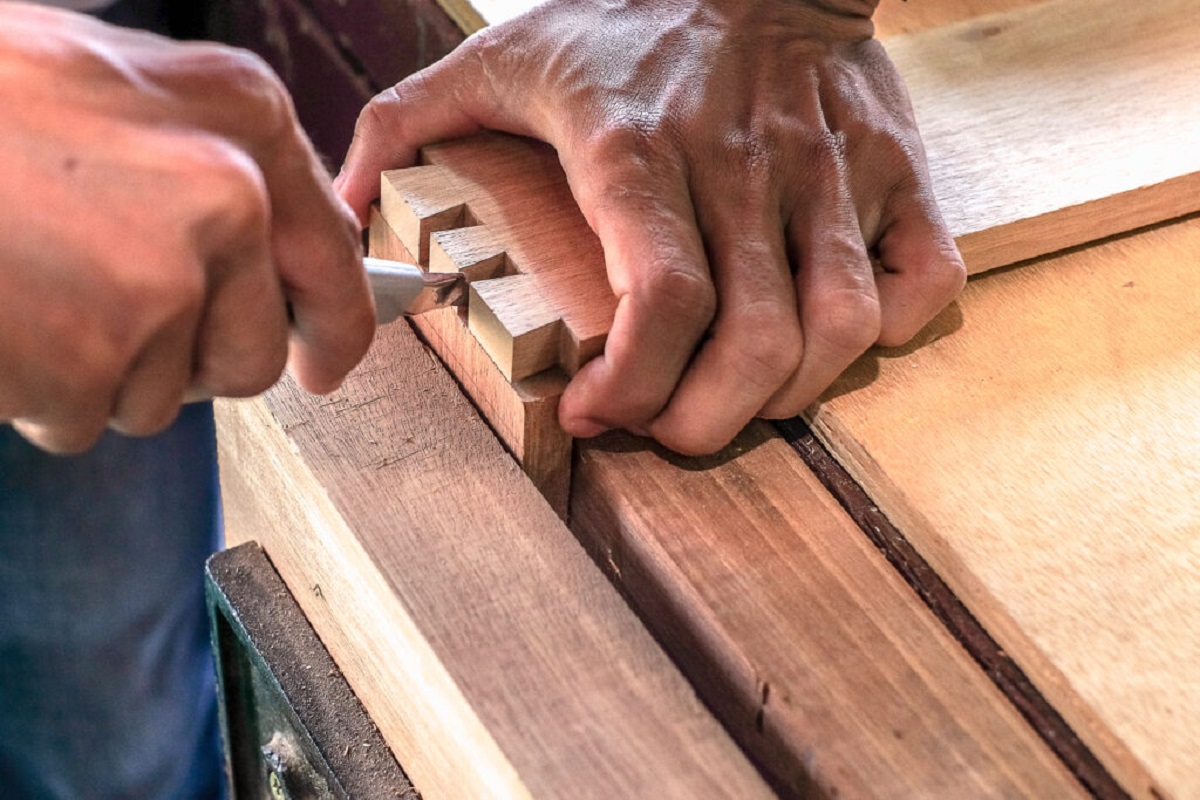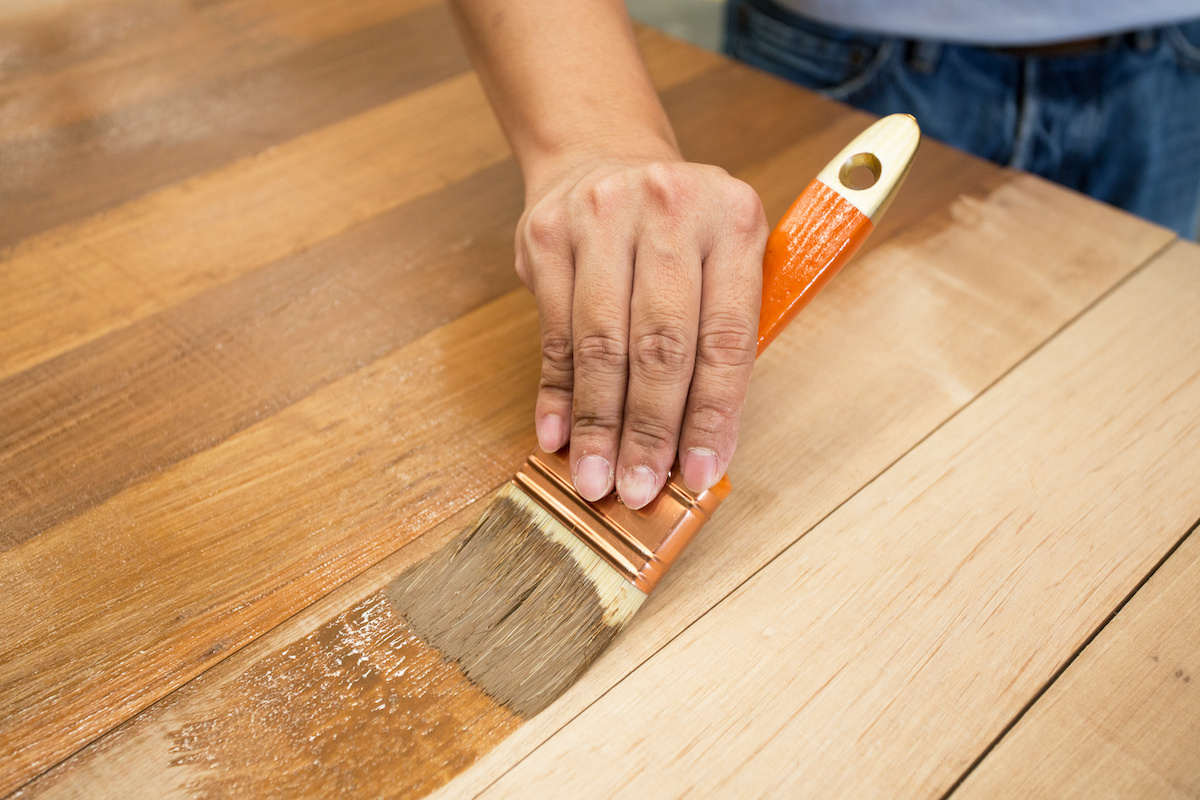

Articles
Where To Buy Wood For Making Furniture
Modified: September 1, 2024
Looking to buy wood for making furniture? Discover the best places to find high-quality wood for all your furniture-making needs.
(Many of the links in this article redirect to a specific reviewed product. Your purchase of these products through affiliate links helps to generate commission for Storables.com, at no extra cost. Learn more)
Introduction
When it comes to building furniture, one of the most crucial aspects is selecting the right type of wood. The choice of wood can significantly impact the overall quality, durability, and aesthetics of the furniture piece. Whether you are an experienced woodworking enthusiast or a novice looking to start your first project, finding the right source for wood is essential.
In this article, we will explore various options for sourcing wood for furniture making. From local specialty stores to online retailers, lumberyards to salvage yards, and sawmills to home improvement stores, we will guide you through the different avenues available to help you find the perfect wood for your furniture projects.
Are you ready to embark on a journey to discover the best places to buy wood for making furniture? Let’s dive in!
Key Takeaways:
- Local specialty stores offer expert advice, high-quality wood selection, and community support. Visit these stores to receive personalized guidance and access a diverse range of wood species for your furniture-making projects.
- Salvage yards provide unique, eco-friendly, and cost-effective wood options with distinctive character. Embrace the charm of salvaged wood to create one-of-a-kind furniture pieces rich in history and visual appeal.
Read more: Where To Buy Real Wood Furniture
Local Specialty Stores
Local specialty stores are a fantastic option for purchasing wood for furniture making. These stores are typically dedicated to selling woodworking supplies, including a wide variety of high-quality wood options. Here are some reasons why local specialty stores are worth exploring:
- Expertise and Advice: Local specialty stores are often staffed by knowledgeable professionals who can provide valuable advice and guidance on selecting the right type of wood for your specific project. They can help you understand the characteristics and properties of different wood species and recommend the most suitable options based on your needs and budget.
- Wide Range of Wood Selection: Specialty stores generally offer a diverse selection of wood species, including both domestic and exotic varieties. You can find common options like oak, maple, and cherry, as well as more unique choices such as mahogany, teak, and walnut. Whether you’re looking for hardwood or softwood, these stores will likely have the options you need.
- Quality Assurance: Local specialty stores take pride in providing high-quality wood products. Since woodworking is their specialty, they are committed to offering wood that meets strict quality standards. This ensures that you are investing in wood that is durable, sturdy, and suitable for furniture making.
- Ability to See and Touch the Wood: Unlike online retailers, local specialty stores allow you to physically examine the wood before making a purchase. You can assess the color, grain pattern, and overall appearance of the wood, ensuring it aligns with your vision for the furniture piece.
- Supporting the Local Community: By purchasing wood from local specialty stores, you are supporting local businesses and craftsmen. Moreover, you have the opportunity to build relationships with fellow woodworking enthusiasts and gain access to a network of resources and knowledge.
To find local specialty stores in your area, consider searching online directories, asking for recommendations from fellow woodworkers, or visiting woodworking forums and communities. Take the time to visit these stores, explore their wood selection, and engage with the store staff to make an informed decision.
While local specialty stores offer numerous advantages, it’s essential to compare prices and quality among different stores. Additionally, keep in mind that the wood selection in these stores may vary, so it’s wise to call ahead to confirm that they have the specific type of wood you require for your furniture project.
Online Retailers
In today’s digital age, online retailers have become a popular and convenient option for purchasing wood for furniture making. Here are some reasons why exploring online retailers can be advantageous:
- Convenience and Accessibility: Online retailers offer the convenience of browsing and purchasing wood from the comfort of your own home. You can access a wide range of wood options from various suppliers, regardless of your location. This allows you to explore and compare different wood species and prices at your own pace.
- Extensive Wood Selection: Online retailers often have a vast selection of wood varieties, including both domestic and exotic species. You can find a wide range of sizes, cuts, and grades to suit your specific furniture-making needs. Whether you’re looking for boards, veneers, or turning blanks, online retailers have you covered.
- Customer Reviews and Ratings: One of the advantages of online shopping is the ability to access customer reviews and ratings. Previous customers often provide valuable insights into the quality, appearance, and performance of the wood products, helping you make an informed decision. Make sure to read multiple reviews and consider the overall consensus before making a purchase.
- Competitive Pricing: Online retailers often have competitive pricing due to the sheer number of suppliers and the ability to compare prices easily. You can find deals, discounts, and bulk purchasing options, allowing you to make the most of your budget.
- Doorstep Delivery: Once you place an order, online retailers will deliver the wood directly to your doorstep. This saves you the hassle of transportation and allows you to focus on your furniture-making project.
When exploring online retailers, it’s important to be mindful of a few considerations:
- Shipping Costs: Some online retailers may charge shipping fees based on the weight and size of the wood. Be sure to factor in these costs when comparing prices.
- Wood Quality: Since you won’t be able to physically inspect the wood before purchasing, it’s crucial to research the retailer’s reputation and look for any guarantees or return policies in case the wood doesn’t meet your expectations.
- Reliable Suppliers: Stick to reputable online retailers with a proven track record of supplying high-quality wood. Read customer testimonials and verify the supplier’s credentials to ensure a positive purchasing experience.
Some popular online retailers to consider for purchasing wood for furniture making include Rockler, Woodcraft, Bell Forest Products, and Amazon. Make sure to check their websites and explore their wood selection, pricing, and shipping options to find the best fit for your needs.
Lumberyards
Lumberyards are another excellent resource for buying wood for furniture making. These establishments specialize in selling lumber and related products to both professional woodworkers and hobbyists. Here are some reasons why lumberyards are worth considering:
- Wide Variety of Wood Species: Lumberyards typically offer a diverse selection of wood species, including both hardwood and softwood options. From popular choices like pine and oak to more exotic types such as mahogany and teak, you can find the perfect wood to suit your furniture-making needs.
- Quality Assurance: Lumberyards focus on providing high-quality wood products. They source their lumber from reputable suppliers, ensure proper storage and handling, and have measures in place to maintain the integrity of the wood. This means you are more likely to find reliable and durable wood for your furniture projects.
- Large Quantities and Custom Orders: Lumberyards typically have a substantial inventory of wood, allowing you to purchase the quantity you need for your project. Whether you require boards for a large dining table or specialized pieces for intricate woodwork, lumberyards can accommodate your needs. Some lumberyards may even offer custom cutting services to provide you with precisely sized pieces.
- Competitive Pricing: Due to their specialization and direct sourcing, lumberyards often offer competitive pricing. You can benefit from cost savings, especially if you require larger quantities or specific wood species that may be more expensive elsewhere.
- Additional Woodworking Supplies: Lumberyards are often well-stocked with other woodworking essentials such as adhesives, finishes, tools, and hardware. This saves you time and allows you to conveniently purchase all the necessary supplies for your furniture-making project in one place.
To find lumberyards in your area, consider searching online directories, checking local business listings, or asking for recommendations from fellow woodworkers. Visit the lumberyards in person to explore their wood selection, interact with the staff, and assess the quality of the wood firsthand.
When visiting a lumberyard, keep the following tips in mind:
- Plan Ahead: Have a clear idea of the type and quantity of wood you require before visiting the lumberyard. This will help you communicate your needs effectively and ensure a smoother purchasing experience.
- Inspect the Wood: Take the time to visually inspect the wood for any defects, damage, or inconsistencies. Check for straightness, cracks, rot, and any other indicators of quality. Lumberyard staff can assist you in selecting the best pieces for your project.
- Ask Questions: Don’t hesitate to ask the lumberyard staff for advice or recommendations. They have extensive knowledge of wood and can help you make the right choices based on your project requirements and budget.
- Consider Sustainability: If environmental sustainability is important to you, inquire about the lumberyard’s practices and whether they offer certified sustainable wood options. This ensures that the wood has been responsibly sourced and supports sustainable forestry practices.
By exploring lumberyards, you can gain access to a wide range of high-quality wood options and receive expert guidance to make the best choices for your furniture-making endeavors.
Consider buying wood from a lumberyard or a specialty wood supplier for making furniture. They often have a wider selection of high-quality wood and can provide expert advice on the best type for your project.
Salvage Yards
Salvage yards offer a unique and unconventional method of acquiring wood for furniture making. These yards specialize in salvaging and repurposing materials from various sources, including old buildings, barns, and fences. Here are some reasons why salvage yards can be a treasure trove for finding wood:
- Unique and Distinctive Wood: Salvaged wood often possesses a unique character and charm that cannot be replicated with new lumber. The wood may have aged patina, weathered textures, and natural imperfections that add character to your furniture pieces. It can provide a rustic, vintage, or reclaimed look that adds depth and interest to your creations.
- Eco-Friendly and Sustainable: By repurposing salvaged wood, you are participating in a sustainable and environmentally friendly practice. Instead of adding to the demand for newly harvested lumber, you are giving new life to materials that would have otherwise been discarded.
- Cost Savings: Salvaged wood is often more affordable compared to new lumber, making it an attractive option for those with a limited budget. You can find high-quality wood at a fraction of the cost, allowing you to create beautiful furniture without breaking the bank.
- Unconventional Sizes and Shapes: Salvages yards may offer wood in unique sizes and shapes that are not readily available in traditional lumber markets. This opens up opportunities for creative and custom furniture designs that stand out from the norm.
- One-of-a-Kind Pieces: Salvaged wood often has a story to tell. It can come from historic buildings or structures, carrying with it a sense of nostalgia and authenticity. Incorporating salvaged wood into your furniture gives you the opportunity to create one-of-a-kind pieces with a rich backstory.
When visiting salvage yards, keep the following points in mind:
- Prepare for Variation: Salvaged wood may have inconsistencies, such as different widths, thicknesses, and levels of wear. Embrace these variations and use them to your advantage to create unique and visually interesting furniture.
- Inspect for Quality: While salvaged wood can have a unique aesthetic appeal, it’s important to inspect it for durability and structural integrity. Look out for signs of rot, insect damage, or other issues that may affect its usability.
- Measurements and Quantity: Salvage yards may not have a standardized sizing system, so be prepared to work with non-traditional measurements. Additionally, salvaged wood quantities may be limited, so plan your project accordingly or be open to creative solutions if you cannot find the exact amount you need.
- Protective Measures: Salvaged wood can come with hidden nails, screws, or other metal elements. Take proper precautions by using metal detectors, wearing safety gloves, and thoroughly inspecting the wood before working with it.
Exploring salvage yards can be a rewarding experience, providing you with unique wood options and the satisfaction of creating furniture with a rich history and a touch of nostalgia.
Read more: Where To Buy Furniture Legs
Sawmills
Sawmills are an excellent choice for purchasing wood directly from the source. These facilities specialize in cutting and processing logs into lumber, offering a range of wood species and cuts. Here are some reasons why sawmills can be a go-to option for buying wood for furniture making:
- Freshly Cut Wood: Sawmills provide access to freshly cut lumber, as they process logs into usable boards. This means you can acquire wood that hasn’t undergone extensive drying or treatment processes, often resulting in a more stable material for furniture making.
- Wide Variety of Wood Species: Sawmills typically offer a diverse selection of wood species, including both common and specialty varieties. You can find options such as pine, cedar, oak, walnut, and many more. This variety allows you to select the wood species that best fits your desired aesthetic and project requirements.
- Customization and Specialty Cuts: Sawmills are often equipped to handle custom orders and specialty cuts. If you need specific dimensions, widths, or lengths for your furniture project, sawmills can accommodate your needs. This level of customization ensures you get the precise lumber required for your design.
- Cost Savings: Purchasing wood directly from a sawmill can often result in cost savings compared to purchasing from intermediaries. By cutting out the middleman, you can access quality lumber at more competitive prices, making it a budget-friendly option for furniture makers.
- Opportunity for Educative Experience: Many sawmills welcome visitors and offer guided tours for those interested in understanding the process of transforming logs into lumber. This can provide valuable insights into the different cuts, grades, and characteristics of various wood species.
When visiting a sawmill, consider the following tips to ensure a successful experience:
- Research and Communication: Before visiting a sawmill, research their operations and policies. Some sawmills may require appointments or have specific operating hours. It’s also helpful to communicate your specific wood requirements in advance to ensure they can accommodate your needs.
- Inspect the Wood: Take the time to inspect the lumber for defects, such as knots, cracks, or warp. Discuss any concerns with the sawmill staff to ensure you receive the best quality wood for your furniture project.
- Consider Drying Time: Freshly cut wood from a sawmill will require additional drying time to reach the appropriate moisture content for furniture making. Discuss the drying process and recommended drying times with the sawmill to plan your project accordingly.
- Understanding Grades: Sawmills often use grading systems to classify their wood based on quality and appearance. Familiarize yourself with the grading system used by the sawmill to select the appropriate grade for your furniture project.
- Transportation and Storage: Keep in mind that purchasing wood from a sawmill may require arranging transportation for the lumber to your workshop. Additionally, ensure you have proper storage facilities to protect and acclimate the wood before using it in your furniture making.
Visiting a sawmill can be a rewarding experience, providing you with access to freshly cut wood and the opportunity to select the perfect lumber for your furniture projects.
Home Improvement Stores
Home improvement stores are a convenient and accessible option for purchasing wood for furniture making. These stores cater to a wide range of DIY enthusiasts and offer a variety of building materials, including wood. Here are some reasons why home improvement stores can be a reliable source for buying wood:
- Convenience: Home improvement stores have multiple locations, making it easy to find one in your area. Their extended operating hours and online ordering options provide convenience and flexibility for purchasing wood.
- Wide Range of Wood Selection: Home improvement stores typically have a diverse selection of wood species, including popular choices like pine, oak, and cedar. They offer a mix of hardwood and softwood options suitable for various furniture-making projects.
- Budget-Friendly Options: Home improvement stores often provide affordable wood options, making them suitable for those on a tight budget. They offer a range of price points, allowing you to find wood that fits your financial requirements.
- Availability of Common Wood Sizes: Home improvement stores stock wood in standard sizes, making it convenient for DIY furniture making. You can find dimensional lumber such as 2x4s, 2x6s, and plywood sheets that work well for many furniture projects.
- Additional Hardware and Supplies: Home improvement stores are a one-stop-shop for all your woodworking needs. In addition to wood, they offer a wide array of tools, hardware, adhesives, and finishes that complement your furniture-making process.
- Consultation and Assistance: Many home improvement store staff members are knowledgeable about different types of wood and can provide assistance and guidance in selecting the right materials for your project. They can help you choose the appropriate wood species and offer tips on cutting, finishing, and woodworking techniques.
When purchasing wood from a home improvement store, consider the following tips:
- Check for Quality: Inspect the wood for any defects, warping, or damage before purchasing. Look for straight, well-milled boards that are free from knots or cracks that may affect the stability and appearance of your furniture.
- Read Labels and Descriptions: Pay attention to labels and descriptions provided by the store to ensure you are choosing the correct type of wood for your project. Consider factors such as the grade, moisture content, and suitability for indoor or outdoor use.
- Consider Joinery and Finishing: Keep in mind that wood from home improvement stores may require further processing, such as cutting and sanding, to achieve the desired dimensions and surface smoothness. Additionally, consider the finishing options available to protect and enhance the appearance of your furniture.
- Ask Questions: Don’t hesitate to ask store staff for advice and recommendations. They can provide insights on the best types of wood for specific projects and offer tips on proper handling, cutting techniques, and finishing methods.
Home improvement stores offer accessibility, affordability, and a range of wood options for your furniture-making needs. Whether you’re a seasoned woodworker or a DIY enthusiast, these stores can provide you with the materials and supplies to bring your furniture projects to life.
Conclusion
When it comes to buying wood for furniture making, there are numerous options available to you. Whether you prefer the expertise of local specialty stores, the convenience of online retailers, the variety of lumberyards, the unique finds at salvage yards, the freshness of sawmills, or the accessibility of home improvement stores, each source has its own advantages.
Local specialty stores provide expert advice and a wide selection of wood species. Online retailers offer convenience, extensive options, and competitive pricing. Lumberyards offer quality assurance, customization, and a range of woodworking supplies. Salvage yards provide unique and eco-friendly wood options. Sawmills offer freshly cut wood and customization possibilities. Home improvement stores provide convenience, affordability, and a one-stop-shop experience.
To choose the right source for your wood, consider factors such as expertise, wood selection, quality assurance, customization options, pricing, and convenience. Think about your project requirements, budget, and personal preferences before making a decision.
Remember to plan ahead, thoroughly inspect the wood, and ask questions to ensure that you select the best quality materials for your furniture-making projects. Whether you’re building a simple bookshelf or a complex dining table, the right choice of wood can greatly enhance the durability, aesthetics, and overall quality of your creations.
So, embark on your wood-buying journey with confidence, knowing that you have a range of options at your disposal. Whether you choose to support local businesses, explore the convenience of online shopping, or venture into salvage yards and sawmills, finding the perfect wood for your furniture projects is within reach.
Embrace the exploration, unleash your creativity, and enjoy the process of turning raw wood into beautiful and functional pieces of furniture that will stand the test of time.
Frequently Asked Questions about Where To Buy Wood For Making Furniture
Was this page helpful?
At Storables.com, we guarantee accurate and reliable information. Our content, validated by Expert Board Contributors, is crafted following stringent Editorial Policies. We're committed to providing you with well-researched, expert-backed insights for all your informational needs.















0 thoughts on “Where To Buy Wood For Making Furniture”